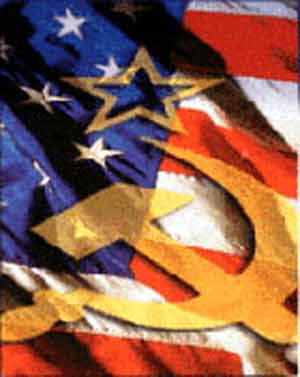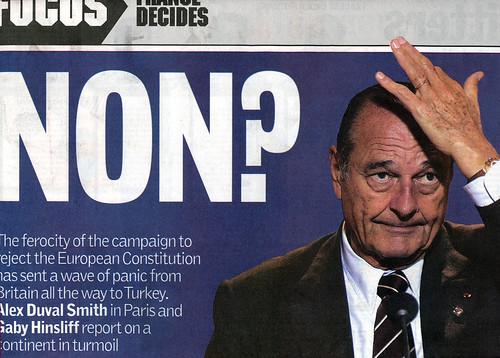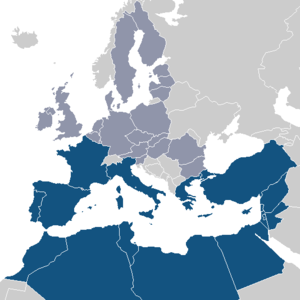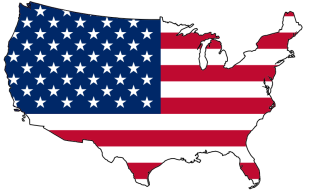Europe's Return to Power Politics
The European Union has grown to the point where it constitutes a market powerhouse but cannot function as a coherent geopolitical entity. So after 60 years of integration, Europe has returned to the style of power politics that reigned before World War II.
By George Friedman
Stratfor Strategic Forecasting
December 7, 2007
By George Friedman
Stratfor Strategic Forecasting
December 7, 2007
 French President Nicolas Sarkozy announced the week of March 16 that France is cutting its nuclear arsenal to less than 300 warheads, which he said was less than half the number France had during the Cold War. Meanwhile, plans are under way in Paris to return to full membership in NATO; Sarkozy will travel to London the week of March 23 to discuss reintegration.
French President Nicolas Sarkozy announced the week of March 16 that France is cutting its nuclear arsenal to less than 300 warheads, which he said was less than half the number France had during the Cold War. Meanwhile, plans are under way in Paris to return to full membership in NATO; Sarkozy will travel to London the week of March 23 to discuss reintegration.Sarkozy spoke while attending the launch of France’s newest nuclear-powered ballistic missile submarine in Cherbourg. During his speech, he added that, at present, none of France’s nuclear weapons is aimed at anyone. During the same appearance he said, “All those who threaten to attack our vital interests expose themselves to a severe riposte by France.” This was said in the context of discussions of Iran, which he said was among those countries in the process of developing nuclear weapons. France is simultaneously calling attention to its nuclear capability and adopting an increasingly hostile posture toward Iran. While the media focus is on Sarkozy, it seems to us that this issue goes deeper than personalities. Processes are under way that are shifting French foreign policy.
The shift is not a dramatic one yet; there is more continuity than discontinuity in French foreign policy. Like all French leaders for the last half-century, Sarkozy is focusing on his country’s strategic independence, particularly on its nuclear capability. At the same time, France is aligning itself more closely with the U.S. view of Iran, and, to some extent, with the U.S. view of the Middle East. In doing so, France is creating stresses within the European Union and reshaping its relationship with Germany. These small changes have broad implications that need to be understood.
Foreign Policy Since 1871
Since 1871, France has had two foreign policies. The year 1871 saw German unification. Prior to 1871, the fragmentation of Germany into numerous ministates secured France’s eastern frontier; France concerned itself with the rest of Atlantic Europe, particularly Spain and England. German unification redefined French geopolitics by creating a major power to its east. This major power was insecure because it was caught between France, Russia and the Austro-Hungarian Empire. German insecurity made it a threat to France. A united Germany had to deal with the causes of that insecurity, and France was one of those causes. German unification effectively coincided with the defeat of France by Prussia, and drove home the significance of a unified Germany.
From German unification and the Franco-Prussian war until 1945, the essence of French foreign policy consisted of managing Germany. That meant France had to change its relationship with its historic rival, the United Kingdom, and keep Russia aligned with the Anglo-French alliance. For more than 80 years, French foreign policy could be boiled down to containing Germany. The strategy proved successful, assuming one accepts the losses incurred in World War I and five years of occupation during World War II. In the end, France survived.
This set in place France’s second post-1871 strategy, which evolved over the 1950s until its institutionalization by Charles de Gaulle. This postwar strategy consisted of two parts. The first part involved embedding France into multinational institutions, particularly the European Economic Community (EEC) — which evolved into the European Union — and NATO. The second part involved using these institutions to preserve French sovereignty and independence. Put differently, France’s strategy was to participate in multinational structures while using them for its own ends, or at least defining a limited relationship with the structures.
France’s overriding concern was to avoid getting caught in a third world war after having been devastated by the first two world wars. Preventing this outcome meant exploiting German disunification, effectively ending France’s primordial fear of Germany. It did this in two ways. The first involved drawing close to West Germany economically, creating a system of relationships that would make Franco-German conflict impossible.
This set in place France’s second post-1871 strategy, which evolved over the 1950s until its institutionalization by Charles de Gaulle. This postwar strategy consisted of two parts. The first part involved embedding France into multinational institutions, particularly the European Economic Community (EEC) — which evolved into the European Union — and NATO. The second part involved using these institutions to preserve French sovereignty and independence. Put differently, France’s strategy was to participate in multinational structures while using them for its own ends, or at least defining a limited relationship with the structures.
France’s overriding concern was to avoid getting caught in a third world war after having been devastated by the first two world wars. Preventing this outcome meant exploiting German disunification, effectively ending France’s primordial fear of Germany. It did this in two ways. The first involved drawing close to West Germany economically, creating a system of relationships that would make Franco-German conflict impossible.
France’s problem was that the deeper that it went into European institutions and NATO, the more tenuous its sovereignty became.
It needed the economic and military relationship with Germany, but it had to retain its room for maneuver. More precisely, it wanted to draw closer to Germany and take advantage of a collective security scheme, but not become a client state of the United States. It therefore belonged to NATO, but pulled out of the alliance’s integrated military command structure in 1966. NATO’s military structure made certain responses to a Soviet invasion automatic. France refused to allow its response to be automatic, but remained committed to collective defense.
France was concerned with maximizing its autonomy, but it had a deeper fear as well.
The defense of Western Europe was predicated on U.S. intervention. The doctrine of massive response held that, in the event of a Soviet invasion that could not be contained conventionally, the United States would use nuclear weapons against the Soviet Union. The U.S. position was thus to initiate a nuclear war that would potentially see America’s cities decimated, all in order to protect Europe.
The defense of Western Europe was predicated on U.S. intervention. The doctrine of massive response held that, in the event of a Soviet invasion that could not be contained conventionally, the United States would use nuclear weapons against the Soviet Union. The U.S. position was thus to initiate a nuclear war that would potentially see America’s cities decimated, all in order to protect Europe.
The French problem, however, was that Paris would not know whether Washington would honor this commitment until after the initiation of hostilities. From the French point of view, it would be irrational for the United States to invite its own devastation to protect Europe. Therefore, the American commitment was at best untestable. At worst, it was an implausible and transparent attempt to jeopardize Europe so as to deter a Soviet attack without the United States risking anything fundamental.
An Independent Deterrent
An Independent Deterrent
The need to protect French sovereignty intersected with what Paris saw as a genuine requirement to maintain a military capability outside the framework of NATO, all the while remaining part of NATO and the EEC. France wanted NATO to function. It wanted to be close to Germany. And it wanted a set of options outside the context of NATO that would guarantee that France would not be reoccupied, this time by the Soviets.
 The decision to construct an independent French nuclear deterrent was based on this reasoning. As de Gaulle put it, France wanted to retain the ability to tear off an arm if the Soviets attacked France through Germany. It was unsure whether the United States would act to deter the Soviet Union, but even a small nuclear force in the hands of a power likely to suffer occupation — and thus a force very likely to be used — would deter the Soviets. Therefore, the French developed (and retain) the nuclear force that Sarkozy decided to cut but not eliminate.
The decision to construct an independent French nuclear deterrent was based on this reasoning. As de Gaulle put it, France wanted to retain the ability to tear off an arm if the Soviets attacked France through Germany. It was unsure whether the United States would act to deter the Soviet Union, but even a small nuclear force in the hands of a power likely to suffer occupation — and thus a force very likely to be used — would deter the Soviets. Therefore, the French developed (and retain) the nuclear force that Sarkozy decided to cut but not eliminate.This issue remained at the heart of U.S.-French tensions both during and after the Cold War. The American view was that the United States and all of Western Europe (plus some Mediterranean countries) had a vested interest in resisting the Soviets, and they could do so most effectively by joining in multilateral economic and military organizations allowing them to operate in concert. The Americans viewed the French reluctance to follow suit as France seeking a free ride. From the American point of view, the U.S. bore the brunt of the cost of defending Europe, as well as underwriting Europe’s economic recovery in the early years. France benefited from both, and would benefit as long as the United States defended Germany. Paris wanted the benefits of the American presence without committing itself to burden-sharing. Put another way, how could the
Americans be certain that, in the event of war, France would protect Germany, Italy or Turkey? Perhaps Paris would remain aloof unless France were attacked.
The French mistrust of the credibility of U.S. commitment to Europe collided with American mistrust of French reasons for being part of NATO without committing itself to collaborate automatically in NATO’s response to the Soviets. France was comfortable with this ambiguity. It needed it. It needed to integrate economically with the Germans, to be part of NATO, but to retain its own options for national defense. If this meant increasing American distrust, and even a sense of betrayal, this was something France must tolerate to achieve its strategic goals.
With the fall of the Soviet Union, France entered a new strategic phase. The French responded to the Soviet collapse and to German reunification by maintaining and extending its core policy. It remained ambiguously part of NATO, participating as it saw fit. It really concentrated on transforming the European Union into a multinational federation, with its own integrated foreign policy and defense policy.
The French mistrust of the credibility of U.S. commitment to Europe collided with American mistrust of French reasons for being part of NATO without committing itself to collaborate automatically in NATO’s response to the Soviets. France was comfortable with this ambiguity. It needed it. It needed to integrate economically with the Germans, to be part of NATO, but to retain its own options for national defense. If this meant increasing American distrust, and even a sense of betrayal, this was something France must tolerate to achieve its strategic goals.
With the fall of the Soviet Union, France entered a new strategic phase. The French responded to the Soviet collapse and to German reunification by maintaining and extending its core policy. It remained ambiguously part of NATO, participating as it saw fit. It really concentrated on transforming the European Union into a multinational federation, with its own integrated foreign policy and defense policy.
This position appears paradoxical. On the one hand, France wanted to maintain its national sovereignty and freedom of action. On the other, it wanted to be a counterbalance to the United States and to draw ever closer to Germany — permanently eliminating the historic danger from its eastern neighbor, however distant the German threat might appear under current circumstances. France could not resist the United States alone. It could do so only in the context of a European federation, which would of course include the critical French relationship with Germany.
Independence vs. Europe
France therefore had to choose between a wholly independent foreign policy and federation with Europe. It tried to have its cake and eat it too. It supported the principle of federation, and within this federation it sought a particularly close relationship with Germany. But its view of this new federation was that while, in a formal sense, France would abandon a degree of sovereignty, in practical terms — so long as France could be the senior partner to Germany — the French would dominate a European federation. In effect, federation would open the door to a Europe directed, if not dominated, by Paris.
This is why Central Europe revolted against French President Jacques Chirac on the eve of the U.S. invasion of Iraq. The Central Europeans were not particularly enthusiastic about the war, but they were far less enthusiastic about Chirac’s actions. From their point of view, he was using the Iraq issue to create a European bloc, led by France in opposition to the United States. For a country such as Poland that had relied on French (and British) guarantees prior to World War II, the idea that France should lead a Europe in opposition to the United States was unacceptable. Chirac gave a famous press conference in which he condemned the Central European rejection of French opposition to the invasion as representing nations that were “not well brought up.” This was the moment in which French frustration welled over.
 France was not going to get the federation it hoped for. Too many countries of Europe wanted to retain their freedom of action, this time from France. They were not opposed to economic union, but the creation of a federation with a joint foreign and defense policy was not enthusiastically greeted by smaller European countries (and some not-so-small countries such as Britain, Spain and Italy). As anti-federationism grew, it swept forward to include France as well, which rejected the European constitution in a plebiscite.
France was not going to get the federation it hoped for. Too many countries of Europe wanted to retain their freedom of action, this time from France. They were not opposed to economic union, but the creation of a federation with a joint foreign and defense policy was not enthusiastically greeted by smaller European countries (and some not-so-small countries such as Britain, Spain and Italy). As anti-federationism grew, it swept forward to include France as well, which rejected the European constitution in a plebiscite.This moment was the existential crisis [??] created the Sarkozy presidency. Sarkozy has raised two questions that have been fundamental to France. The first is France’s relationship to Germany. France has been obsessed with Germany since 1871, at first hostile, later nearly married, but always obsessed. The second question relates to France’s relationship to the United States. Chirac represented postwar Gaullism’s view in its most extreme form: Convert European institutions into a French-dominated multinational force to balance U.S. power. This attempt collapsed, so Sarkozy had to define the relationship France might have with the United States if France could not counterbalance the United States.
The Mediterranean Union
 The questions of Germany and of the United States were addressed in the French idea of a Mediterranean Union. Since German unification in 1871, France has obsessed about the north German plain. But France is also a Mediterranean power, with long-term interests in North Africa and the Middle East in such countries as Algeria, Morocco, Tunisia, Lebanon and Syria. Where Germany is entirely a northern European power, France is not. Therefore, Chirac proposed that, in addition to being a member of the European Union, France should create a separate and distinct Mediterranean Europe. The latter grouping would include the rest of the Mediterranean basin, extending as far as Turkey and Israel. It would exclude non-Mediterranean powers such as Germany and Britain, however.
The questions of Germany and of the United States were addressed in the French idea of a Mediterranean Union. Since German unification in 1871, France has obsessed about the north German plain. But France is also a Mediterranean power, with long-term interests in North Africa and the Middle East in such countries as Algeria, Morocco, Tunisia, Lebanon and Syria. Where Germany is entirely a northern European power, France is not. Therefore, Chirac proposed that, in addition to being a member of the European Union, France should create a separate and distinct Mediterranean Europe. The latter grouping would include the rest of the Mediterranean basin, extending as far as Turkey and Israel. It would exclude non-Mediterranean powers such as Germany and Britain, however.France had no intention of withdrawing from the European Union, but saw the Mediterranean Union as a supplemental relationship, and argued that it would allow EU expansion without actually admitting new EU members. The Germans saw this as a French attempt to become Europe’s strategic pivot, leading both unions and serving as the only member that was both a northern European and a Mediterranean power. The Germans did not like this scenario one bit. The French then backed off, but did not abandon the idea.
If the French are going to be a Mediterranean power, they must also be a Middle Eastern power. If they are playing in the Middle East, they must redefine their relationship with the United States. Sarkozy has done that by drawing systematically closer to American views on Iran, Syria and Lebanon. In other words, to pursue this new course, the French have drawn away from the Germans and closer to the Americans.
This is all very early in the game, and the moves so far are very small. But the French have slightly backed off from their German obsession and their fear of the United States.
This is all very early in the game, and the moves so far are very small. But the French have slightly backed off from their German obsession and their fear of the United States.
 The collapse of European federationism has set off a reconsideration of France’s global role, a reconsideration that will — if continued — radically redefine France’s core relationships.
The collapse of European federationism has set off a reconsideration of France’s global role, a reconsideration that will — if continued — radically redefine France’s core relationships.What the French are doing is what they have done for years: They are looking for maximum freedom of action for France without undue risk. Though France has long pursued its interests with consistency, its current moves are different. It appears to be pulling away from Germany and seeking power in the Mediterranean.

And that means working with the Americans.






